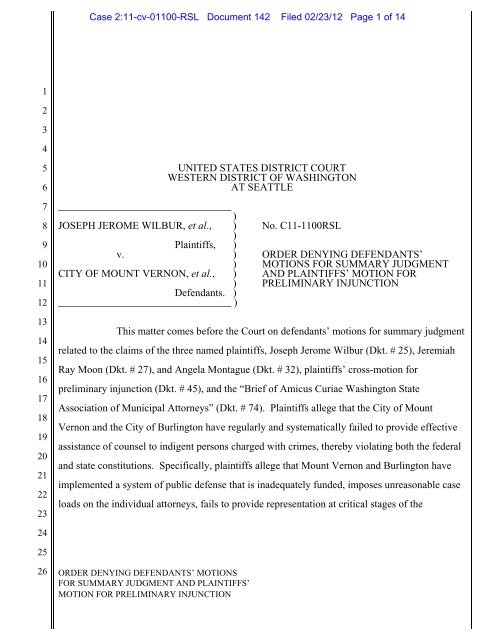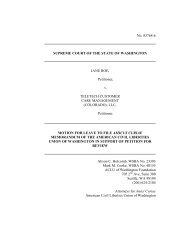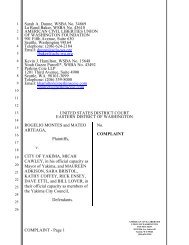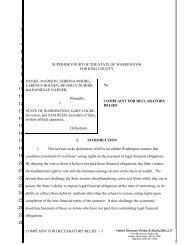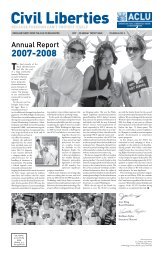order denying defendants' motions for summary judgment and ...
order denying defendants' motions for summary judgment and ...
order denying defendants' motions for summary judgment and ...
Create successful ePaper yourself
Turn your PDF publications into a flip-book with our unique Google optimized e-Paper software.
Case 2:11-cv-01100-RSL Document 142 Filed 02/23/12 Page 1 of 141234567891011121314151617181920212223UNITED STATES DISTRICT COURTWESTERN DISTRICT OF WASHINGTONAT SEATTLE_________________________________)JOSEPH JEROME WILBUR, et al., ) No. C11-1100RSL)Plaintiffs, )v. ) ORDER DENYING DEFENDANTS’) MOTIONS FOR SUMMARY JUDGMENTCITY OF MOUNT VERNON, et al., ) AND PLAINTIFFS’ MOTION FOR) PRELIMINARY INJUNCTIONDefendants. )_________________________________ )This matter comes be<strong>for</strong>e the Court on defendants’ <strong>motions</strong> <strong>for</strong> <strong>summary</strong> <strong>judgment</strong>related to the claims of the three named plaintiffs, Joseph Jerome Wilbur (Dkt. # 25), JeremiahRay Moon (Dkt. # 27), <strong>and</strong> Angela Montague (Dkt. # 32), plaintiffs’ cross-motion <strong>for</strong>preliminary injunction (Dkt. # 45), <strong>and</strong> the “Brief of Amicus Curiae Washington StateAssociation of Municipal Attorneys” (Dkt. # 74). Plaintiffs allege that the City of MountVernon <strong>and</strong> the City of Burlington have regularly <strong>and</strong> systematically failed to provide effectiveassistance of counsel to indigent persons charged with crimes, thereby violating both the federal<strong>and</strong> state constitutions. Specifically, plaintiffs allege that Mount Vernon <strong>and</strong> Burlington haveimplemented a system of public defense that is inadequately funded, imposes unreasonable caseloads on the individual attorneys, fails to provide representation at critical stages of the242526 ORDER DENYING DEFENDANTS’ MOTIONSFOR SUMMARY JUDGMENT AND PLAINTIFFS’MOTION FOR PRELIMINARY INJUNCTION
Case 2:11-cv-01100-RSL Document 142 Filed 02/23/12 Page 2 of 141234567891011121314151617181920212223242526prosecution, <strong>and</strong> is not properly monitored. 11 Defendants take issue with plaintiffs’ assertions that the public defenders, Messrs. Sybr<strong>and</strong>y<strong>and</strong> Witt, spend only 40% <strong>and</strong> 33% of their time, respectively, in public defense, that they are assignedto h<strong>and</strong>le approximately 1000 misdemeanor cases per year, that counsel spends on average less than 35minutes on each case, <strong>and</strong> that the public defenders took only two cases to trial in 2010. Reply (Dkt.# 65) at 5-7. Although some of these assertions are not supported by admissible evidence (<strong>for</strong> example,the percentages stated on the AVVO printouts appear to be hearsay), there is evidence supportingplaintiffs’ overarching argument that counsels’ workload is unmanageable. To the extent defendantsdispute that assertion <strong>and</strong> have produced declarations to contradict the case assignment data, timerecords, <strong>and</strong> annual reports on which plaintiffs rely, the Court declines to decide disputed issues of factin the context of a <strong>summary</strong> <strong>judgment</strong> motion.2 Plaintiffs’ sur-reply in response to defendants’ first motion to strike (Dkt. # 71) isunauthorized. Local Civil Rule 7(g) permits the filing of a sur-reply only <strong>for</strong> the purpose of objecting tomaterial contained in or attached to a reply brief, not to respond to another party’s motion to strike. Infact, responses to <strong>motions</strong> to strike “shall not be filed unless requested by the court.” CR 7(g)(4). Nosuch request was made in this instance. Plaintiffs’ response has there<strong>for</strong>e not been considered in rulingon defendants’ evidentiary objections.ORDER DENYING DEFENDANTS’ MOTIONSFOR SUMMARY JUDGMENT AND PLAINTIFFS’MOTION FOR PRELIMINARY INJUNCTION -2-Plaintiffs also allege that the municipalities haveknown of the structural deficiencies in their public defense systems <strong>for</strong> many years <strong>and</strong> yetcontinue the system without substantive change.Having reviewed the memor<strong>and</strong>a, declarations, <strong>and</strong> exhibits submitted by theparties <strong>and</strong> having heard the arguments of counsel, the Court finds as follows:A. Motions to StrikeDefendants raise hearsay <strong>and</strong> authenticity objections to most if not all of thedeclarations <strong>and</strong> exhibits submitted by plaintiffs in opposition to the motion <strong>for</strong> <strong>summary</strong><strong>judgment</strong> <strong>and</strong> in support of their motion <strong>for</strong> preliminary injunction. Reply (Dkt. # 65) at 4. 2Defendants have not articulated any reason to doubt the authenticity or admissibility of many ofthe exhibits provided, including court documents, published per<strong>for</strong>mance st<strong>and</strong>ards, thecontracts under which the public defender system is operated, <strong>and</strong> defendants’ business records.Defendants mention only three documents (or types of documents) with any levelof specificity. The first, a collection of complaints regarding the services provided by the public
Case 2:11-cv-01100-RSL Document 142 Filed 02/23/12 Page 3 of 1412345678910111213141516171819202122232425defenders, was apparently produced by the municipalities <strong>and</strong> is offered to show that defendantshad knowledge of the problems in the public defender system. Decl. of Toby J. Marshall (Dkt.# 57) at Ex. 18. Because the documents appear to be what plaintiffs claim <strong>and</strong> are not offered toestablish the truth of the matters asserted therein, defendants’ objections are overruled. Thesecond document is described as “a sensationalist newspaper article, recounting what a nonpartysupposedly said.” Reply (Dkt. # 65) at 4. The offending document is not identified bydocket or exhibit number. The Court assumes that defendants are referring to the article thatmakes up a portion of Ex. 15 to Mr. Marshall’s declaration <strong>and</strong> that the non-party statements arethose of public defender Richard Sybr<strong>and</strong>y. Because the Court is unable to ascertain which, ifany, hearsay exceptions might apply, the Court has not considered this article in ruling on theunderlying <strong>motions</strong>. Finally, defendants object to the expert opinion of David Boerner on theground that he offers no support <strong>for</strong> his conclusion that “the prosecution’s previouslyenumerated expectations <strong>for</strong> the Right to Counsel are not being met with respect to the publicdefense services” provided by defendants. Decl. of David Boerner (Dkt. # 53) at 16. To thecontrary, Mr. Boerner sets <strong>for</strong>th his experience as a prosecutor in both the federal <strong>and</strong> statesystems, identifies the services <strong>and</strong> communications a prosecutor would expect an accused toreceive from his attorney, <strong>and</strong> lists the documents he reviewed regarding the system in MountVernon <strong>and</strong> Burlington. Defendants may take issue with Mr. Boerner’s conclusion, but theyoffer no basis on which to exclude it from evidence.In their opposition to plaintiffs’ motion <strong>for</strong> preliminary injunction, defendantsinclude a ten-line motion to strike significant portions of plaintiffs’ evidence, including thedeclaration of plaintiff Wilbur, “[a]ll confidential communications improperly obtained fromSkagit County,” <strong>and</strong> all expert opinions that rely on such in<strong>for</strong>mation. Dkt. # 115 at 33. Twoseparate <strong>motions</strong> have been filed regarding the declaration <strong>and</strong> confidential communications(Dkt. # 78 <strong>and</strong> Dkt. # 87 respectively): the Court declines to incorporate <strong>and</strong> decide those26 ORDER DENYING DEFENDANTS’ MOTIONSFOR SUMMARY JUDGMENT AND PLAINTIFFS’MOTION FOR PRELIMINARY INJUNCTION -3-
Case 2:11-cv-01100-RSL Document 142 Filed 02/23/12 Page 4 of 1412345678910111213141516171819202122232425<strong>motions</strong> here.Finally, defendants object to arguments asserted by plaintiff in support of theirmotion <strong>for</strong> preliminary injunction. Dkt. # 128. Arguments of counsel are not evidence <strong>and</strong> willnot be considered as such by the Court or the ultimate factfinder. If an argument is whollyunsupported <strong>and</strong>/or conflicts with the available evidence, it will be disregarded. Arguments can,however, be based on common sense inferences or limited/equivocal evidence. In suchinstances, the weight given the argument will depend on many factors, but the argument is notper se inadmissible. Because there is evidence from which one could infer that indigent criminaldefendants are unfamiliar with the attorney substitution options available to them, the objectionto that argument is overruled. See Decl. of J. Camille Fisher (Dkt. # 122), Ex. 1 at 102:8-11, Ex.11. Plaintiffs’ contention that defendants conceded that they do not supervise, monitor, orevaluate their public defenders is not adequately supported, however. The only citation is to amemor<strong>and</strong>um in which plaintiffs set <strong>for</strong>th their related argument that complaints have beenlodged regarding the public defenders’ failure to be responsive <strong>and</strong>/or to provide representation.There is no evidence of a concession, <strong>and</strong> the argument has not been considered.B. Availability of Injunctive <strong>and</strong>/or Declaratory ReliefPlaintiffs are seeking only prospective equitable relief in the above-captionedmatter. Defendants argue that neither injunctive nor declaratory relief is available, however,because the law provides adequate remedies <strong>for</strong> the constitutional violation alleged. Inparticular, defendants argue that, if an indigent criminal defendant is unhappy with therepresentation af<strong>for</strong>ded by his public defender, he could request the appointment of new counsel,assert an ineffective assistance of counsel claim on appeal, <strong>and</strong>/or sue the public defender <strong>for</strong>malpractice. While these remedies would be sufficient if plaintiffs’ claims were limited toineffective assistance of counsel claims under Strickl<strong>and</strong> v. Washington, 466 U.S. 668 (1984),plaintiffs are not simply challenging counsels’ conduct in their individual cases. Rather,26 ORDER DENYING DEFENDANTS’ MOTIONSFOR SUMMARY JUDGMENT AND PLAINTIFFS’MOTION FOR PRELIMINARY INJUNCTION -4-
Case 2:11-cv-01100-RSL Document 142 Filed 02/23/12 Page 5 of 1412345678910111213141516171819202122232425plaintiffs argue that the City of Mount Vernon <strong>and</strong> the City of Burlington are systematicallydepriving indigent criminal defendants of the right to counsel promised in Gideon v.Wainwright, 372 U.S. 335 (1963).Plaintiffs allege that municipal policymakers have made deliberate choicesregarding the funding of, contracting <strong>for</strong>, <strong>and</strong> monitoring of the public defense system thatdirectly <strong>and</strong> predictably deprived plaintiffs of their Sixth Amendment right to the assistance ofcounsel. At this early stage of the litigation, the evidence, including plaintiffs’ declarationsregarding their own experiences within the system, could support a finding that indigentdefendants in Mount Vernon <strong>and</strong> Burlington are deprived of counsel at critical stages of theprosecution <strong>and</strong> that the assignment of public defenders is little more than a sham. See Avery v.State of Alabama, 308 U.S. 444, 446 (the absence of “an opportunity <strong>for</strong> appointed counsel toconfer, to consult with the accused <strong>and</strong> to prepare his defense, could convert the appointment ofcounsel into a sham <strong>and</strong> nothing more than a <strong>for</strong>mal compliance with the Constitution’srequirement that an accused be given the assistance of counsel.”). See also Hurrell-Harring v.State of New York, 930 N.E.2d 217, 224 (N.Y. 2010) (recognizing that “[a]ctual representationassumes a certain basic representational relationship,” such that the failure to communicate<strong>and</strong>/or appear at critical stages of the prosecution may be reasonably interpreted asnonrepresentation rather than ineffective representation).Faced with a government system that arguably violates a constitutional guaranteeon a regular basis, plaintiffs appeal to equity <strong>for</strong> a systemic remedy. Such requests are not newto the federal courts. Where official government policies trample rights guaranteed by theConstitution, the courts have not hesitated to use their equitable powers to correct the underlyingpolicies or systems. See, e.g., Brown v. Bd. of Educ., 349 U.S. 294 (1955) (calling on districtcourts to use equitable principles to achieve the desegregation promised in the first Brown v. Bd.of Educ. decision); Brown v. Plata, __ U.S. __, 131 S. Ct. 1910 (2011) (affirming federal26 ORDER DENYING DEFENDANTS’ MOTIONSFOR SUMMARY JUDGMENT AND PLAINTIFFS’MOTION FOR PRELIMINARY INJUNCTION -5-
Case 2:11-cv-01100-RSL Document 142 Filed 02/23/12 Page 6 of 1412345678910111213141516171819202122232425oversight of Cali<strong>for</strong>nia state prisons to remedy systemic Eighth Amendment violations). TheCourt finds that case-by-case requests <strong>for</strong> new counsel, appeals, <strong>and</strong>/or malpractice actionswould not resolve the systemic problems identified by plaintiffs, making a request <strong>for</strong> injunctive<strong>and</strong> declaratory relief necessary.Defendants, relying on Strickl<strong>and</strong> <strong>and</strong> its progeny, also argue that plaintiffs cannotseek a systemic remedy because a Sixth Amendment claim will not lie unless <strong>and</strong> until they havesuffered actual prejudice at trial. Under this theory, plaintiffs would have to wait until they werewrongfully convicted or sentenced be<strong>for</strong>e they could assert a Sixth Amendment claim. Courtshave long recognized, however, that indigent criminal defendants have a right to counsel “fromthe time of their arraignment until the beginning of their trial, when consultation, thorough-goinginvestigation <strong>and</strong> preparation [are] vitally important . . . .” Powell v. State of Alabama, 287 U.S.45, 57 (1932). If a request <strong>for</strong> counsel is rejected or counsel’s overall representation is sodefective that the prosecution’s case cannot be tested through a truly adversarial process, theright to a fair trial – which is the underlying goal of the Sixth Amendment – is at risk. UnitedStates v. Cronic, 466 U.S. 648, 655-57 (1984). As discussed above, plaintiffs’ allegations can bereasonably understood to assert a lack of representation. In such circumstances, there is nopresumption of harmless error or requirement that the indigent defendant plod on towards<strong>judgment</strong> in <strong>order</strong> to establish harm: the constitutional violation is clear <strong>and</strong> a remedy isavailable. Contrary to defendants’ argument, the Court will not “indulge in nice calculations asto the amount of prejudice” attributable to the lack of counsel – a hypothetical undertaking akinto trying to prove a negative – where the denial of representation itself demonstrates aconstitutional violation. Cuyler v. Sullivan, 446 U.S. 335, 349 (1980) (summarizing Glasser v.United States, 315 U.S. 60 (1942)).In this case, plaintiffs allege that the public defense system in Mount Vernon <strong>and</strong>Burlington leaves indigent criminal defendants without representation at critical points during26 ORDER DENYING DEFENDANTS’ MOTIONSFOR SUMMARY JUDGMENT AND PLAINTIFFS’MOTION FOR PRELIMINARY INJUNCTION -6-
Case 2:11-cv-01100-RSL Document 142 Filed 02/23/12 Page 7 of 1412345678910111213141516171819202122232425the prosecution. Specifically, plaintiffs have provided evidence (a) that appointed counsel refuseto engage in confidential attorney-client communications regarding the charges, possibledefenses, litigation options, <strong>and</strong> sentencing, (b) that the criminal defendant is left to face thejudge <strong>and</strong> prosecutor alone <strong>and</strong> unaided, <strong>and</strong> (c) that defendants are advised to plead guilty in theabsence of any investigation or analysis, seemingly <strong>for</strong> case management reasons rather thanreasons germane to the merits of the case. If plaintiffs are able to prove their claims, they maybe able to establish a breakdown in the adversarial process such that the eventual outcomes oftheir cases, whatever they may be, would be suspect. Having realized that they were effectivelyunrepresented against the prosecuting municipalities, plaintiffs can seek judicial intervention.They do not have to persevere through trial <strong>and</strong> a potentially disastrous outcome in <strong>order</strong> toperfect their Sixth Amendment claims.C. St<strong>and</strong>ing <strong>and</strong> MootnessOn October 17, 2011, the Court denied plaintiffs’ motion to amend their complaintto add Ryan Osborne as a named plaintiff on st<strong>and</strong>ing grounds.In <strong>order</strong> <strong>for</strong> Mr. Osborne to be added as a named plaintiff, he must “allegepersonal injury fairly traceable to the defendant’s allegedly unlawful conduct <strong>and</strong>likely to be redressed by the requested relief.” Hein v. Freedom From ReligionFoundation, Inc., 551 U.S. 587, 598 (2007) (quoting Allen v. Wright, 468 U.S.737, 751 (1984)). In other words, he must satisfy the “irreducible constitutionalminimum of st<strong>and</strong>ing.” Steel Co. v. Citizens <strong>for</strong> a Better Environment, 523 U.S.83, 102 (1998) (quoting Lujan v. Defenders of Wildlife, 504 U.S. 555, 560(1992)). Now that the City of Mount Vernon has dismissed the charges againsthim, Mr. Osborne is no longer represented by a public defender or otherwisethreatened by the alleged systemic deprivation of counsel. Thus, any prospectiverelief obtained in this litigation will not enure to Mr. Osborne’s benefit.Dkt. # 44 at 2-3. Defendants argue that the same analysis should result in the dismissal of all thenamed plaintiffs’ claims because they are no longer represented by the public defender. To the26 ORDER DENYING DEFENDANTS’ MOTIONSFOR SUMMARY JUDGMENT AND PLAINTIFFS’MOTION FOR PRELIMINARY INJUNCTION -7-
Case 2:11-cv-01100-RSL Document 142 Filed 02/23/12 Page 8 of 1412345678910111213141516171819202122232425extent this change in representation is relevant, it did not occur until after the complaint wasfiled. Defendants offer no facts or argument from which one could conclude that plaintiffslacked the requisite personal interest (i.e., st<strong>and</strong>ing) at the commencement of the litigation.Defendants’ challenge is more appropriately characterized as an assertion ofmootness. In <strong>order</strong> to “qualify <strong>for</strong> adjudication in a federal court, a live controversy must existat all stages of the litigation . . . .” Vasquez v. Los Angeles County, 487 F.3d 1246, 1253 (9thCir. 2007). Where the named plaintiffs have lost their personal interest in the outcome of thecase, they are generally precluded from pursuing relief either <strong>for</strong> their own benefit or on behalfof a class.The record in the above-captioned matter does not support a finding that plaintiffshave lost their personal interest. Although plaintiff Montague has already been sentenced in hercriminal matter, she is currently on probation, has a hearing scheduled (at least as of November2011), <strong>and</strong> is being represented by the “conflict” public defender, Hoff. Dkt. # 116, Ex. D at 26.Attorney Hoff’s position as “secondary defender” is expressly prescribed in the public defenseservices contract. Dkt. # 57-1 at 17. Plaintiff Moon has one or more open criminal matters, haspending court dates (at least as of November 2011), <strong>and</strong> is also being represented by attorneyHoff. Dkt. # 116, Ex. E at 50-51, 106. Plaintiff Wilbur had a pretrial conference scheduled <strong>for</strong>December 7, 2011, but apparently failed to appear <strong>and</strong> continues to be represented by conflictcounsel. Dkt. # 122 at 72. Because plaintiffs continue to be represented by a public defenderprovided by the municipalities pursuant to the public defense services contract at issue in thislawsuit, the claims of the named plaintiffs are not moot.Even if, <strong>for</strong> purposes of this motion, the Court assumes that the assignment of analternate public defender mooted the named plaintiffs’ claims, this case falls into an exception tothe mootness doctrine. Where the class of plaintiffs at issue is transitory (meaning that there is aconstant class of persons suffering from the alleged deprivation, but that individuals within the26 ORDER DENYING DEFENDANTS’ MOTIONSFOR SUMMARY JUDGMENT AND PLAINTIFFS’MOTION FOR PRELIMINARY INJUNCTION -8-
Case 2:11-cv-01100-RSL Document 142 Filed 02/23/12 Page 9 of 1412345678910111213141516171819202122232425class will likely lose their interest while the case is pending), the Court may “validly certify aclass . . . even though the named plaintiff’s claims are already moot, since the ‘relation back’doctrine will relate to [the named plaintiffs’] st<strong>and</strong>ing at the outset of the case in <strong>order</strong> ‘topreserve the merits of the case <strong>for</strong> judicial resolution.’” Wade v. Kirkl<strong>and</strong>, 118 F.3d 667, 670(9th Cir. 1997). See also See Gerstein v. Pugh, 420 U.S. 103, 110 n.11 (1975); Pitts v. TerribleHerbst, Inc., 653 F.3d 1081, 1091 (9th Cir. 2011) (applying “relations back” doctrine wheredefendant’s litigation strategy of settling the small claims of the named plaintiffs made the class“transitory”).The Court finds that the proposed class is transitory <strong>for</strong> purposes of the mootnessanalysis. It is virtually impossible to predict which individual members of the proposed class, ifany, will have a live controversy at the time the class is certified, much less at the time this caseis finally resolved. When the named plaintiffs came to the conclusion that they were not gettingthe assistance of counsel promised by the state <strong>and</strong> federal constitutions, they not surprisinglysought counsel elsewhere. The record shows that defendants dismissed the charges against atleast one potential class member, apparently in a successful ef<strong>for</strong>t to keep him from becoming anamed plaintiff. Others individuals will plead guilty, have their charges dismissed, or go to trialbe<strong>for</strong>e the merits of this case can be reached. In these circumstances, even if the claims of thethree named plaintiffs became moot, the Court would still proceed to the class certificationdetermination be<strong>for</strong>e deciding whether the action should be dismissed <strong>for</strong> mootness.D. Municipal Liability Under § 1983Under 42 U.S.C. § 1983, a municipality such as Mount Vernon or Burlington maybe held liable <strong>for</strong> constitutional violations only when the violation occurs as a result of themunicipality’s official “policy or custom.” Monell v. New York City Dept. Soc. Servs., 436U.S. 658, 694 (1978). This rule ensures that municipalities are liable only <strong>for</strong> “acts that are,properly speaking, acts of the municipality.” Pembauer v. City of Cincinnati, 475 U.S. 469, 48026 ORDER DENYING DEFENDANTS’ MOTIONSFOR SUMMARY JUDGMENT AND PLAINTIFFS’MOTION FOR PRELIMINARY INJUNCTION -9-
Case 2:11-cv-01100-RSL Document 142 Filed 02/23/12 Page 10 of 1412345678910111213141516171819202122232425(1986) (internal quotation marks omitted). Plaintiffs allege that defendants have made funding,contracting, <strong>and</strong> monitoring decisions which directly <strong>and</strong> predictably deprive indigent criminaldefendants of their Sixth Amendment right to counsel. These decisions by the municipalitiesserve as “policymaking” <strong>for</strong> purposes of Monell. See Mir<strong>and</strong>a v. Clark County, 319 F.3d 465,470 (9th Cir. 2003) (county’s resource allocation policy can be the basis <strong>for</strong> a § 1983 claimagainst the municipality). If plaintiffs are able to show that municipal policy caused the allegedconstitutional violations, municipal liability may exist under § 1983.Defendants argue that, because the public defenders are not “state actors” <strong>for</strong>purposes of § 1983, the claim against the municipalities must fail. It is clear that plaintiffscannot seek to impose § 1983 liability on the public defenders <strong>for</strong> the per<strong>for</strong>mance of traditionallawyerly functions. See Polk County v. Dodson, 454 U.S. 312, 325 (1981). To the extentplaintiffs’ claims against Mount Vernon <strong>and</strong> Burlington are derivative of potential claims againstthe public defenders, defendants’ argument may have some merit. Plaintiffs, however, areseeking to hold the municipalities liable <strong>for</strong> the ineffective public defense system they createdthrough their affirmative decisions, acts, <strong>and</strong> policies, regardless of any individualized error inwhich the public defenders may or may not have engaged in particular cases. As discussedabove, the municipalities may be held responsible <strong>for</strong> their own conduct to the extent it deprivedplaintiffs of their constitutional rights.Defendants’ “deliberate indifference” argument is misplaced. Plaintiffs haveprovided evidence that defendants’ official municipal acts <strong>and</strong> affirmative policies caused aconstitutional deprivation. That is all that is required <strong>for</strong> municipal liability under Monell. SeeBrass v. County of Los Angeles, 328 F.3d 1192, 1198 (9th Cir. 2003). Other theories underwhich a municipality can be held liable, such as a failure to act or a failure to train theory, areless direct. In the absence of an affirmative municipal act or policy, courts will require evidencethat the municipality made a conscious or deliberate choice reflecting indifference to the26 ORDER DENYING DEFENDANTS’ MOTIONSFOR SUMMARY JUDGMENT AND PLAINTIFFS’MOTION FOR PRELIMINARY INJUNCTION -10-
Case 2:11-cv-01100-RSL Document 142 Filed 02/23/12 Page 11 of 1412345678910111213141516171819202122232425constitutional rights of its citizens in <strong>order</strong> to ensure that the municipality is held liable only <strong>for</strong>its own wrongdoing. See Lee v. City of Los Angeles, 250 F.3d 668, 681 (9th Cir. 2001). Evenif deliberate indifference were required when the acts or affirmative policies of the municipalityare at issue, plaintiffs have provided evidence that could support such a finding. Deliberateindifference exists when the need <strong>for</strong> different or remedial action “is so obvious, <strong>and</strong> theinadequacy so likely to result in the violation of constitutional rights, that the policymakers ofthe city can reasonably be said to have been deliberately indifferent to the need.” City of Cantonv. Harris, 489 U.S. 378, 390 (1989). Plaintiffs have provided evidence from which a reasonablejury could conclude that defendants knew indigent criminal defendants were not receivingrepresentation at key stages of the prosecution <strong>and</strong> were deliberately indifferent to their plight.Finally, defendants argue that federal courts must refrain from constitutionalizingspecific per<strong>for</strong>mance st<strong>and</strong>ards or otherwise interfering with the attorney-client relationship.Federal courts should not attempt to specify a code of conduct that is universally required of allcriminal defense counsel under the Sixth Amendment. See Strickl<strong>and</strong>, 466 U.S. at 688-89; Nixv. Whiteside, 475 U.S. 157, 165 (1986). Nevertheless, the courts clearly have the power, if notthe constitutional obligation, to evaluate the representation that was provided to the class <strong>and</strong> todeclare it sufficient or insufficient. Where the underlying right to representation is at issue, theappropriate relief does not necessarily require a detailed code of conduct, but rather a moregeneral directive to remedy the situation so that the guarantee of assistance has meaning. SeePowell v. State of Alabama, 287 U.S. 45 (1932).E. Equitable Bars to ReliefDefendants argue that the doctrine of judicial estoppel bars plaintiffs fromchallenging the reasonableness of the public defenders’ actions. In particular, defendants arguethat plaintiffs’ written consent to continuances of their criminal trials precludes their currentargument that the consent was unin<strong>for</strong>med <strong>and</strong>/or that counsel acted unreasonably. Plaintiffs’26 ORDER DENYING DEFENDANTS’ MOTIONSFOR SUMMARY JUDGMENT AND PLAINTIFFS’MOTION FOR PRELIMINARY INJUNCTION -11-
Case 2:11-cv-01100-RSL Document 142 Filed 02/23/12 Page 12 of 1412345678910111213141516171819202122232425positions do not necessarily contradict each other, however. Plaintiffs allege that they werecompelled to accept continuances because counsel was unprepared <strong>and</strong> unable to proceed at theirvarious court dates. In such circumstances, a request <strong>for</strong> a continuance is not approval of theconduct which made the request unavoidable. In addition, judicial estoppel should not be usedto bar a Sixth Amendment claim when the attorney’s conduct precipitated the earlier statements.See Morris v. State of Cal., 966 F.2d 448, 453 (9th Cir. 1991). The Court there<strong>for</strong>e declines toapply the doctrine of judicial estoppel in these circumstances.Defendants also argue that plaintiffs should be precluded from seeking equitablerelief because they have unclean h<strong>and</strong>s. Defendants assert that all three named plaintiffs havefailed to appear <strong>for</strong> court hearings related to their criminal proceedings <strong>and</strong>/or are the subject ofbench warrants <strong>for</strong> their arrests. Under a doctrine developed in the 1800's, appellate courts havediscretion to dismiss appeals of convicted criminals or illegal aliens who have fled <strong>and</strong> cannot belocated when their appeals are heard. See Smith v. United States, 94 U.S. 97 (1876); Antonio-Martinez v. INS, 317 F.3d 1089, 1092 (9th Cir. 2003). The justifications <strong>for</strong> the doctrine are:“(1) the pragmatic concern with ensuring that the court’s <strong>judgment</strong> will be en<strong>for</strong>ceable againstthe appellant; <strong>and</strong> (2) the equitable notion that a person who flouts the authority of the courtwaives his entitlement to have his appeal considered.” Sun v. Mukasey, 555 F.3d 802, 804 (9thCir. 2009).All of the cases identified by defendants involve the dismissal of a direct appeal ofan underlying conviction or immigration <strong>order</strong> after the appellant has escaped from custody.Defendants have not identified, <strong>and</strong> the Court has not found, any case in which an unconvicted,non-custodial citizen was barred from seeking relief in a separate civil suit because he had anoutst<strong>and</strong>ing bench warrant. The underlying doctrine of unclean h<strong>and</strong>s suggests that the fugitivedisentitlement doctrine should not be extended to the situation presented here. Whendetermining whether a claimant’s unclean h<strong>and</strong>s bar recovery, “[w]hat is material is not that the26 ORDER DENYING DEFENDANTS’ MOTIONSFOR SUMMARY JUDGMENT AND PLAINTIFFS’MOTION FOR PRELIMINARY INJUNCTION -12-
Case 2:11-cv-01100-RSL Document 142 Filed 02/23/12 Page 13 of 1412345678910111213141516171819202122232425plaintiff’s h<strong>and</strong>s are dirty, but that he dirtied them in acquiring the right he now asserts, or thatthe manner of dirtying renders inequitable the assertion of such rights against the defendants.”Ellenburg v. Brockway, Inc., 763 F.2d 1091,1097 (9th Cir. 1985) (citation omitted). While theCourt does not approve of plaintiffs’ respective failures to appear as <strong>order</strong>ed by the municipalcourts, those failures did not give rise to the constitutional right plaintiffs seek to en<strong>for</strong>ce in thislitigation, there is a separation <strong>and</strong> disconnect between the municipal criminal proceedings <strong>and</strong>this action that did not exist in any of the cases relied upon by defendants, <strong>and</strong> there is noindication that plaintiffs’ fugitive status will impede their ability to pursue this case or precludeen<strong>for</strong>cement of this Court’s <strong>judgment</strong>. The Court declines to disentitle plaintiffs from pursuingtheir constitutional claims on the ground that they have failed to appear in their criminalproceedings.F. Preliminary InjunctionIn <strong>order</strong> to obtain preliminary injunctive relief, plaintiff must establish “that he islikely to succeed on the merits, that he is likely to suffer irreparable harm in the absence ofpreliminary relief, that the balance of equities tips in his favor, <strong>and</strong> that an injunction is in thepublic interest.” Winter v. Natural Res. Def. Council, 555 U.S. 7, 129 S. Ct. 365, 374 (2008).In addition, “serious questions going to the merits <strong>and</strong> a hardship balance that tips sharplytowards the plaintiff can support issuance of an injunction, so long as the plaintiff also shows alikelihood of irreparable injury <strong>and</strong> that the injunction is in the public interest.” Alliance <strong>for</strong> theWild Rockies v. Cottrell, 622 F.3d 1045, 1053 (9th Cir. 2010) (internal quotation marksomitted).Plaintiffs have raised serious questions regarding the constitutional adequacy ofthe public defender systems in place in Mount Vernon <strong>and</strong> Burlington, but the incompletefactual records makes it impossible to conclude at this stage that they are likely to succeed on themerits. Where likelihood of success is in doubt, plaintiffs must show that the balance of26 ORDER DENYING DEFENDANTS’ MOTIONSFOR SUMMARY JUDGMENT AND PLAINTIFFS’MOTION FOR PRELIMINARY INJUNCTION -13-
Case 2:11-cv-01100-RSL Document 142 Filed 02/23/12 Page 14 of 14123456789101112131415hardships tips sharply in favor of issuing the injunction. This they cannot do. Although thedeprivation of counsel at critical stages of a criminal prosecution would, of course, createhardships <strong>for</strong> proposed class members, the wholesale restructuring of the cities’ public defensesystems would also impose significant hardships on defendants, their budgetary priorities, <strong>and</strong>their citizenry. Where the balance of hardships does not tip decidedly in plaintiffs’ favor, theymust wait until they have proven their right to relief in <strong>order</strong> to obtain an injunction.For all of the <strong>for</strong>egoing reasons, defendants’ <strong>motions</strong> <strong>for</strong> <strong>summary</strong> <strong>judgment</strong> (Dkt.# 25, # 27, <strong>and</strong> # 32) <strong>and</strong> plaintiffs’ cross-motion <strong>for</strong> preliminary injunction (Dkt. # 45) areDENIED.Dated this 23rd day of February, 2012.ARobert S. LasnikUnited States District Judge1617181920212223242526 ORDER DENYING DEFENDANTS’ MOTIONSFOR SUMMARY JUDGMENT AND PLAINTIFFS’MOTION FOR PRELIMINARY INJUNCTION -14-


